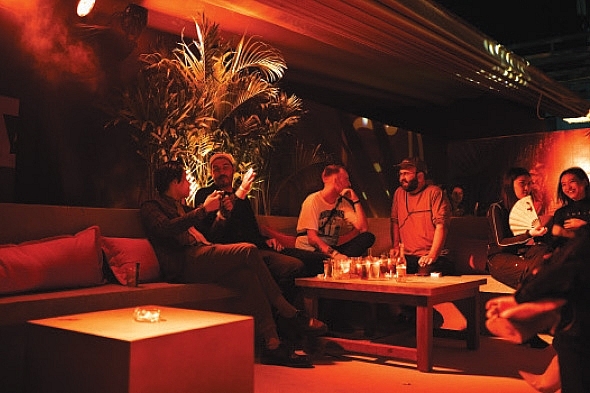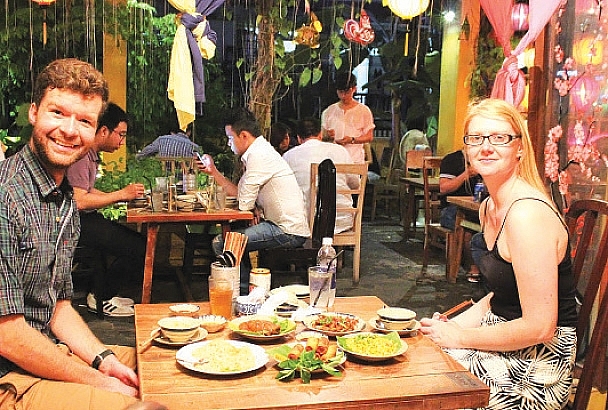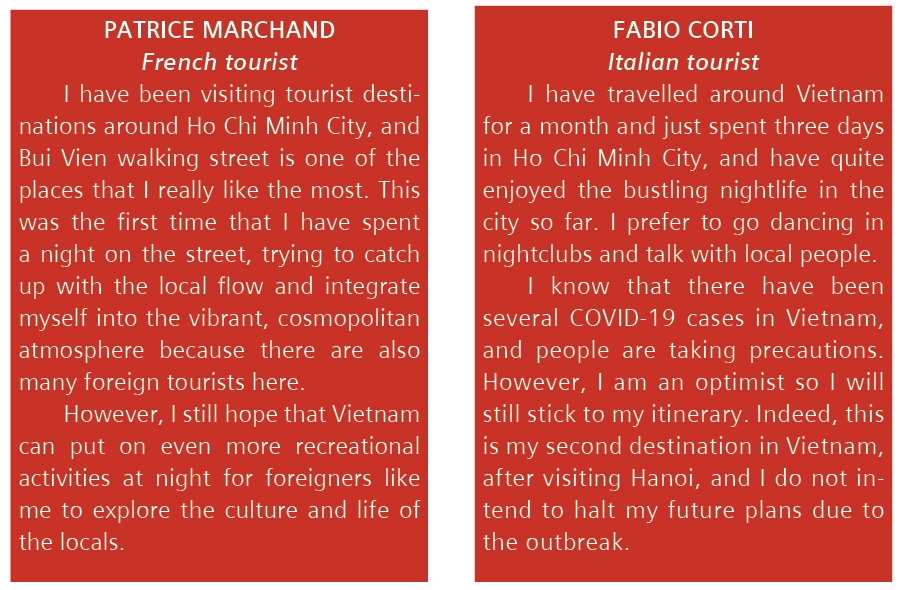Staying at home no more
 |
| Staying at home no more |
Wandering around the beer streets, which are hotspots for foreigners to enjoy drinks on their travels such as Ta Hien in Hanoi’s Old Quarter, Xuan Dieu in the city’s expat district of Tay Ho, or Bui Vien pedestrian street in Ho Chi Minh City, a large number of visitors are still found despite warnings to stay away from crowds during the current health epidemic.
As long-distance trips have been limited or frowned upon during the outbreak, some people tend to stay at home to avoid infection. Others, however, cannot stand boredom and find other recreational activities instead to avoid going stir crazy. Simply going out for a drink can be one of the ideal choices.
Bill Badger, an American expat working in education sector in Vietnam, said that he has barely left the house recently and has interacted with others less during the period, when schools in Vietnam have been closed. Instead, he chose to work on some of his art projects. “I can no longer continue not going out after almost one week, so I plan to visit my favourite pub this weekend,” said Bill.
Visiting a bar in Xuan Dieu with his group of friends, English teacher Ryan Miller admitted that he has actually been going outside more than usual. “It would be a pity if we didn’t,” he said. “Our classes are all cancelled due to the epidemic, so we have been bored just staying inside the house. We have more free time to enjoy entertainment, and we actually love hitting the streets at this time because they are not as crowded as usual.”
The warnings surrounding the outbreak mean that many Vietnamese have refrained from gathering in crowded places, or eating and drinking out. In addition, the impact of the new drink-driving bill, which came into effect in January, has sharply changed local habits of drinking at bia hois or restaurants. On the other hand, these factors are not affecting expat and tourist communities in Vietnam in the same way.
More than a one and half months after Decree No.100/2019/ND-CP on administrative sanctions for road traffic and rail transport violations took effect, Cuong Nguyen, founder of C-Brewmaster Beer JSC told Timeout that his craft beer bars have witnessed a drop of 30-50 per cent due to the serial effects of both the decree and the global virus outbreak.
“Our restaurant on Pham Huy Thong street, mostly visited by Vietnamese customers, has seen a significant decrease of guests. They now come to our restaurants by taxi or ride-hailing services, and those who drive here themselves will not drink alcoholic beverages anymore, but soft drinks instead. This has led to a slight downturn in sales. And with the health crisis posing serious issues, we have seen even less visitors,” Cuong said.
“However, there is barely any fluctuation at our bar on Luong Ngoc Quyen as the majority of customers there are foreign tourists,” he added.
 |
This is a common situation at many businesses providing alcoholic beverages in Vietnam since Decree 100 was officially put into operation. With fines of up to VND40 million for driving a car under the influence of alcohol and VND8 million for being intoxicated on a motorbike, many Vietnamese people have reduced their alcohol consumption before participating in traffic.
According to a bartender at Miss Saigon Restaurant & Bar, when asked about walker flow on the street outside, she stated that when Decree 100 was enacted lower numbers of people entered the bar, but the situation did rally after a few weeks. In addition, with the main customers of surrounding bars being international tourists and expats, they are still seeing a decent number of guests.
“Foreigners here enjoy walking, so they are still able to enjoy the nightlife in Ho Chi Minh City,” she said, adding that things are slowly returning to what they were before.
 |
Though having stirred up the beverage business, as well as restaurants and the traditional bia hois, the bill is generally receiving positive support from both Vietnamese people and expats living in the country.
Julien Psomas, a Frenchman living in Hanoi for five years, said that ever since the law took effect, he has felt safer when going out. “Besides that, taking a taxi in Vietnam is incredibly cheap and you can easily hop on one after drinking,” he stated.
First entering Vietnam in 2016, Japanese designer Takuya quickly fell in love with the Vietnamese drinking culture. “Drinking, shaking hands, and interacting with others makes me feel connected to people. Moreover, when drinking, people come closer to each other and differences are put aside,” said Takuya.
However, he admitted that Vietnamese often drink too much and too quickly. He strongly supports the law because it could improve people’s conscience, adding that laws against drink driving in Japan have existed for a long time, with even tougher penalties involving jail time. Thanks to strict government sanctions, Japan is consistently in the top 10 countries with the lowest alcohol-related accident rates in the world.
Although the drink driving bill is a novel practice in Vietnam, foreigners living in the country say that it is nowhere near a surprise to them, as in their homelands intoxicated driving has long been illegal. Drivers are not only penalised financially, but can be permanently banned from driving or even imprisoned for violations. Therefore, international visitors have been long accustomed to using public transport after even a sip of alcohol, and drinking responsibly when heading out.
Under the impact of the new law and the coronavirus epidemic, streets may be more sparsely crowded for a while, but foreign visitors are still filling up bars, pubs, and restaurants regularly, while bar owners are coming up with new ways to entice more customers.
C-Brewmaster’s Cuong Nguyen told Timeout that he has recently introduced two new beverages, passion fruit beer and cherry cider, to meet the changing demand of customers. “They are naturally-brewed beverages rich in vitamins and antioxidants, helping to enhance drinkers’ immune systems,” Nguyen said. “These new products have become the brand’s bestsellers, with 60-70 higher sales than our old products.”
What the stars mean:
★ Poor ★ ★ Promising ★★★ Good ★★★★ Very good ★★★★★ Exceptional
Themes: Safe and Sound Vietnam
Related Contents
Latest News
More News
- Tides of Heritage: A Tet speciality at InterContinental Phu Quoc Long Beach (January 20, 2026 | 12:08)
- Muong Thanh launches Lunar New Year gifts inspired by tradition (January 16, 2026 | 16:41)
- The Grand Ho Tram seeks responsible entertainment with pilot casino access (January 16, 2026 | 10:56)
- Ocean Resort by Fusion Quy Nhon launches Lunar New Year 2026 package (January 15, 2026 | 11:11)
- Regent Phu Quoc announces general manager appointment (January 15, 2026 | 11:06)
- Fusion to debut two landmark hotels in early 2026 (December 26, 2025 | 11:46)
- Pan Pacific Hanoi unveils festive season of light and music (December 15, 2025 | 18:22)
- JW Marriott Hotel & Suites Saigon unveils festive initiatives (December 12, 2025 | 15:12)
- Festive magic by nature unfolds at JW Marriott Cam Ranh Bay Resort & Spa (December 11, 2025 | 18:17)
- The Reverie Saigon presents festive programme (December 11, 2025 | 18:15)

 Tag:
Tag:


















 Mobile Version
Mobile Version